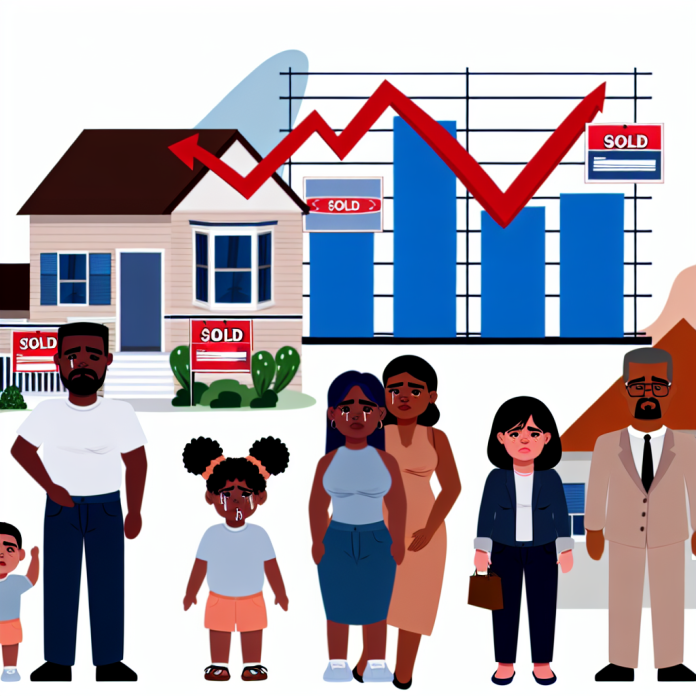Investors buying US homes are reshaping the landscape of the American real estate market, significantly impacting first-time homebuyers and families in search of affordable housing. Recent data reveals that nearly 27% of homes sold in the first quarter were purchased by these real estate investors, marking a five-year peak that highlights a trend of rising home prices. As traditional buyers face increasing challenges due to high costs and interest rates, the role of investors becomes more pronounced in these housing market trends. This surge in investment activity raises concerns over the affordable housing crisis, with many potential homeowners being pushed out of the market altogether. Consequently, as more investors enter the fray, the availability of homes is dwindling, further complicating the quest for those hoping to buy their first home.
The recent surge in property acquisition by financial backers and real estate companies is altering the dynamics of the US home-buying landscape. With home prices climbing and financing conditions tightening, many would-be homebuyers find themselves sidelined, as these buyers seek to capitalize on lucrative rental markets. This phenomenon not only underscores the unique challenges faced by first-time home seekers but also emphasizes a broader trend of rising demand for housing amidst a tightening supply. As these market forces intertwine, the struggles of average Americans in securing their dream homes amidst an affordable housing crisis are starkly evident. The implications of these shifts could potentially reshape the future of property ownership for generations to come.
The Growing Influence of Investors in the U.S. Housing Market
In recent years, the U.S. housing market has seen a distinct shift as investors buying U.S. homes have become increasingly influential. According to a report, real estate investors accounted for nearly 27% of all home purchases in the first quarter of the year. This percentage represents the highest level of investor acquisition in five years, highlighting a significant trend where traditional buyers are being increasingly sidelined due to rising home prices and stringent borrowing conditions. Investors, motivated by potential rental income and resale profits, are positioning themselves as key players in the marketplace.
The trend of investors dominating home purchases reflects broader economic challenges faced by average would-be homeowners. The rise in housing prices, combined with persistent inflation and high-interest rates, means that many first-time homebuyers are finding the dream of homeownership slipping further out of reach. Real estate experts are concerned that this growing investor presence may exacerbate the current affordable housing crisis, making it even harder for families trying to secure stable housing.
Impact of Rising Home Prices on First-Time Homebuyers
As homes continue to be purchased by savvy real estate investors, the ripple effect on the housing market poses serious challenges for first-time homebuyers. The relentless increase in home prices often discourages young families and individuals who are attempting to break into the housing market. Investors typically have the capital to outbid traditional buyers, further driving up prices in many neighborhoods. This scenario creates a significant barrier for those looking for affordable housing options, which is a critical issue for an increasing number of people.
Moreover, the impact of rising housing costs goes beyond the immediate struggles faced by first-time buyers. It can potentially alter community dynamics and demographic trends as affordable housing becomes scarce. Families who once could aspire to own their own homes may find themselves in a prolonged rental situation, or worse, pushed out to more affordable areas that lack essential services, amenities, or employment opportunities. The government and housing advocates are urging initiatives to promote affordable housing development, aiming to restore balance in a market heavily skewed towards investors.
Corporate Investment vs. Individual Buyers: Navigating the Housing Market’s Challenges
In the current landscape, individual homebuyers find themselves competing not just against one another but against large corporate entities that have budgetary advantages and market insights. These sizable investors such as institutional buyers, often purchase properties in bulk, appealing to regions perceived as having growth potential. This corporate investment strategy puts individual homebuyers at a disadvantage, leading many to forgo ownership altogether. The stress these buyers face underscores a significant concern: how can they secure their own property amidst an aggressive investor landscape?
Additionally, as the market continues to evolve, the gap between wealthy investors and everyday buyers widens. Individual buyers may struggle to compete in bidding wars where investors are equipped to pay cash, thus circumventing the obstacles of mortgage approval and lengthy purchasing processes. This dynamic may change the fabric of neighborhoods, driving long-term residents out as homes become more of an investment vehicle rather than a place for families to thrive. Addressing this concern requires a multi-faceted approach that considers both the aspirations of individual buyers and the realities of investor behavior in the housing market.
Addressing the Affordable Housing Crisis: Solutions and Initiatives
The escalating percentages of homes purchased by investors indicate a growing affordable housing crisis that needs urgent attention from policymakers and community leaders. Solutions could include capping the number of homes that any single investor can purchase in a given area or introducing taxes on property flips that investors frequently undertake. These measures could help stem the tide of influxes in housing prices, making it easier for first-time homebuyers and families to secure affordable homes.
Moreover, there is a compelling need for increasing the supply of housing development specifically aimed at lower-income segments. Collaborations between public and private sectors may pave the way for innovative housing projects that provide diversity in housing options. Additionally, enhancing support for first-time homebuyers through programs like down payment assistance and favorable loan rates can empower these individuals to navigate today’s competitive real estate environment effectively.
Long-Term Effects of Investor Purchases on Market Stability
The juxtaposition of heightened investor activity with traditional homebuying trends raises crucial concerns about long-term market stability. Increased purchases by investors can create an artificial inflation of home prices that may not align with actual market value or community purchasing power. This could potentially lead to a housing bubble, where inflated prices eventually crash, leaving many investors and renters vulnerable.
In addition to price inflation, the concentration of investment properties can lead to homogenization within communities, where individual ownership is replaced by rental units owned by a few corporations. This could affect local economies, social cohesion, and community identity. Real estate experts emphasize the importance of regulatory frameworks that maintain a balance between investor interests and community needs, ultimately safeguarding the stability and affordability of the housing market.
Investor Behavior Trends in Real Estate Market
Understanding investor behavior is crucial in navigating the complexities of real estate markets. Many investors are currently drawn to specific markets that promise not just quick returns but also long-term appreciation values. By closely monitoring housing market trends, they can make informed decisions about where to allocate their funds, often prioritizing metros with growing job markets and favorable climates.
The behavior of these investors often influences pricing in these markets, as they drive demand through their acquisitions. This ongoing trend raises questions about the sustainability of investor-driven prices and how they affect local buyers. Continuous investment without balance may create cyclic booms and busts that disrupt the middle-class aspirations of obtaining homeownership.
The Role of Innovative Financing in Housing Market Strategies
Innovative financing solutions can play a pivotal role in shifting dynamics in the housing market, addressing both the needs of investors and those of prospective homebuyers. Creative options, such as shared equity agreements, can allow first-time buyers to enter the market with reduced financial burden. This cooperation could open doors for homeownership opportunities while still accommodating investment interests.
Investors could also explore partnerships with local governments to support affordable housing initiatives, leveraging their funds for mutual benefit. As investor strategies evolve, finding common ground between profitability and community stewardship will be essential to ensure a thriving housing market that is accessible to individuals and families.
Emerging Neighborhoods: Investment Hotspots for Real Estate Investors
In the race to capitalize on market trends, real estate investors are often targeting emerging neighborhoods that show promise for growth. This focus has the potential to reshape urban landscapes as revitalization initiatives attract homebuyers and renters alike. Investors typically seek areas where economic development is vibrant, creating opportunities for increased property values and future profits.
Such activities can lead to gentrification, where existing residents may find themselves priced out of their communities. Balancing revitalization with maintaining affordability has become a crucial discussion among local leaders and stakeholders. Striking this balance is essential to ensure that emerging neighborhoods serve the interests of current residents while allowing for new developments that enrich the area.
Navigating Economic Pressures and Housing Affordability
The confluence of economic pressures such as inflation and increased borrowing costs highlights the complexities of housing affordability in today’s market. These factors disproportionately affect first-time buyers, who often need to navigate a landscape that’s increasingly competitive. Real estate investors offering cash bids can outmaneuver these buyers, thereby exacerbating the affordability crisis and raising broader questions about access to housing.
To tackle this issue, community programs aimed at financial education and support are essential. Helping potential homebuyers understand mortgages, budgeting, and the importance of credit scores can empower them to make informed financial decisions, ensuring they remain competitive in the market. Meanwhile, economic stability and policies aimed at wage growth are critical to fostering an environment where homeownership remains within reach for the average American.
Frequently Asked Questions
How are investors buying US homes impacting the housing market trends?
Investors buying US homes are significantly impacting housing market trends by purchasing nearly 27% of homes sold in early 2025. This trend is pushing up home prices, making it challenging for first-time homebuyers to enter the market. As investors outbid traditional buyers, the competition intensifies, leading to concerns about housing affordability.
What are the effects of real estate investors on the affordable housing crisis?
The rise of real estate investors buying US homes exacerbates the affordable housing crisis. As these investors purchase a large share of properties, particularly in desired locations, it drives up prices and reduces the inventory available for average buyers and families seeking affordable housing options.
Why are first-time homebuyers struggling in a market dominated by investors buying US homes?
First-time homebuyers are struggling in a market dominated by investors due to the higher purchasing power of these investors, who can often pay in cash and close quickly. This situation leads to increased competition, making it difficult for first-time buyers to make competitive offers, further sidelining them from purchasing their first home.
What role do rising home prices play for investors buying US homes?
Rising home prices are a significant factor for investors buying US homes, as these increases provide potential for higher returns on investment through rental income or resale. However, this also complicates the landscape for traditional buyers, contributing to the overall housing affordability crisis.
How does investor activity in housing markets influence buyer strategies for homes?
Investor activity in housing markets influences buyer strategies as traditional buyers must adapt by offering higher bids, exploring less competitive neighborhoods, or seeking alternative financing options. This shift often leads to frustration among average buyers, with many altering their home buying goals due to the aggressive purchasing strategies of investors.
| Key Point | Details |
|---|---|
| Investor Share of Home Sales | Investors bought nearly 27% of homes sold in the first quarter of the year, the highest proportion in five years. |
| Impact on Traditional Buyers | Rising prices and high borrowing costs make it difficult for traditional buyers to afford homes. |
| Reasons for Investor Purchases | Investors often buy homes to rent or resell, increasing demand in the market. |
| Concerns for Market Stability | The increasing presence of investors may inflate prices and reduce availability for first-time buyers. |
Summary
Investors buying US homes represent a growing trend in the market, capturing nearly 27% of all home sales in early 2025. As traditional buyers struggle with high prices and borrowing costs, investors continue to play a pivotal role, potentially affecting long-term affordability and market stability. This shift not only highlights the challenges faced by average homebuyers but also raises concerns about the impact on the overall housing landscape.
Source: https://www.ocregister.com/2025/07/08/investors-buying-homes/
### Transform Your Home: Expert Remodeling Services in Orange County
As one of the most affluent regions in California, Orange County offers unique opportunities for homeowners looking to invest in substantial renovations. At the heart of this thriving market, cities like Laguna Beach and Newport Beach feature median home values around $1.18M, making them prime candidates for high-value remodeling projects ranging from $50K to $500K+. Homeowners in these areas are increasingly looking for ways to enhance their living spaces, whether it be a modern kitchen remodel, luxurious bathroom upgrades, or expanding outdoor living areas to enjoy the stunning OC climate.
### The Importance of Local Regulations and Building Codes
When embarking on a remodeling project in Orange County, it’s vital to stay informed about California building codes and obtaining the necessary permits. Each city, from Irvine to Costa Mesa, may have its own set of regulations that could impact your renovation timeline and budget. Contractors must stay up-to-date on these requirements to ensure compliance and avoid costly delays or fines. Understanding the local landscape can set your contracting business apart, as you can provide clients with peace of mind by guiding them through the permit process effectively.
### Sustainable Remodeling: Addressing OC Climate Considerations
Contractors in Orange County have a unique opportunity to champion sustainable building practices. With our region’s mild climate, homeowners are increasingly interested in energy-efficient solutions such as solar panels and high-performance windows. By promoting environmentally friendly materials and installation techniques, contractors not only appeal to the eco-conscious market but also stand to benefit from potential cost savings for their clients in the long term. This focus could position your business as a leader in the green remodeling movement in OC, thus attracting more clients seeking these specific services.
### Growing Your Contractor Business in Orange County
The demand for quality remodeling services continues to grow in Orange County, particularly as homeowners recognize the value of investing in their properties. Contractors should leverage this trend by offering bespoke services that cater to the specific needs of affluent homeowners. Networking through local trade shows and community events can open new pathways for collaboration with suppliers and other home service professionals, allowing you to expand your service offerings while boosting business visibility.
### Engage with the Local Remodeling Community
Whether you are an established contractor or just starting out, engaging with the local homeowner community can significantly impact your success. Consider hosting home improvement workshops or informational sessions about the latest trends in OC remodeling to establish your brand as a trusted resource. Utilize social media platforms to showcase your completed projects in cities like Huntington Beach and highlight customer testimonials. Not only will this increase your visibility, but it will also help build relationships with potential clients who value local expertise and insight into the Orange County housing market.


